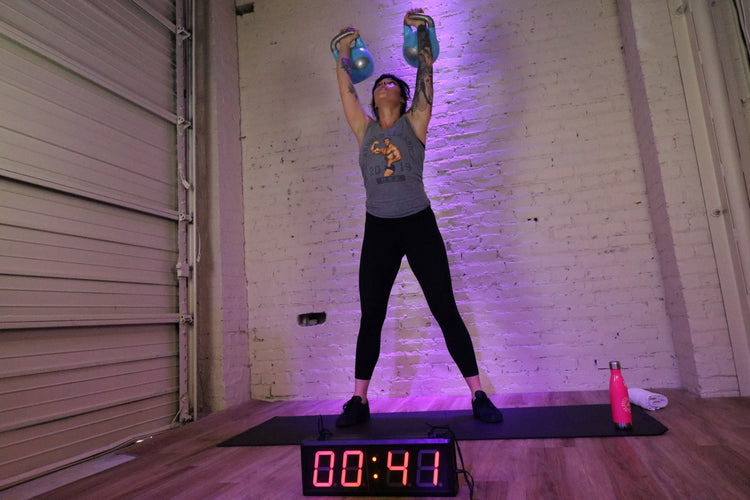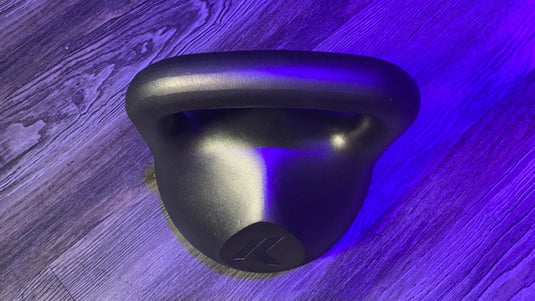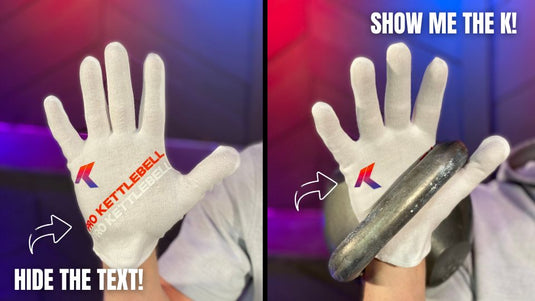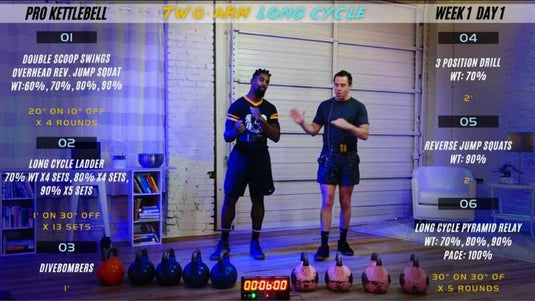What Size Kettlebell Should I Start With?

Most of the kettlebell weight training guidance that I have seen on the internet recommends "what kettlebell size for beginners" to be at least a 16kg (35lb) kettlebell for men and an 8kg (18lb) or even 12kg (26lb) kettlebell for women, but I feel that is entirely too heavy.
There is definitely a time and a place to lift heavy. Like powerlifting for example. When I coached and competed in powerlifting we would calculate workload based on percentages of our “one-rep max” and build gradually until we could peek and actually perform that one-rep max (usually in competition only).
The benefit of this progressive type of training is that it strengthens your bones, your tendons - and of course your muscles - to exert an extreme amount of force in a very short period of time.
But the closer you get to your max potential, the more likely you are to suffer injury. That is what happened to me and many others I've known who have competed in powerlifting. Trying to recover from an injury that I sustained training heavy squats and deadlift is what got me into kettlebells over a decade ago.
What Weight to Start With: Kettlebells
When I first began kettlebell lifting, I followed the advice that a man should lift 24 kg or more and that 16 kgs were reserved for women… and quickly injured my rotator cuff.
I felt it wouldn't be beneficial to lift any lighter, especially since I had come from the powerlifting world where 53 pounds is nothing.
I learned the hard way that a 53-pound kettlebell can be as dangerous as a 500-pound deadlift. Turns out, when you swing a kettlebell you add inertia and at certain points of a swing or snatch, that weight can feel up to 10 times heavier. Plus, the weight of the kettlebell doesn't sit in the center of your hand but rather at the end of a handle, which means extra leverage on your joints.
I've learned a lot since then, through competing and coaching kettlebell sport, and through operating my own gym where I've had the pleasure of teaching thousands of people how to use kettlebells.

Choosing a Kettlebell
Through these experiences in addition to learning from Honored Masters of Sport in kettlebell lifting from its homeland in Russia, I have adopted a lighter-weight higher-volume approach, and that is what I recommend in general.
This lighter-weight, high-volume approach allows you to lift much more in total volume than if you were doing a traditional low-rep, heavy-weight program, while allowing you to get cardiovascular and technique benefits as well.
It's not uncommon for someone using a lighter kettlebell starting weight (even 4 kg, which is 8.8 lbs) to lift over 1000 pounds in a single workout doing one of our online kettlebell classes. But the greatest part is you're not losing out on the strength gains.
It's quite common to see a barbell squat or deadlift improve with the use of kettlebell training. As mentioned above, the biggest benefit of this approach is its much lower risk for injury. No long-term progress will be made if you are chronically injured.
Nothing can derail your fitness goals quicker than an injury. That's why we recommend the kettlebell weights for beginners below (deduct 2 to 4 kg if you have nagging injuries).
The weight of a beginner kettlebell is also going to differ based on the exercises you do with it:
- two-handed kettlebell swings (heavier)
- ballistic movements (medium)
- overhead squats (lighter)
- goblet squats (heavier), etc.
Also, you will use different kettlebell weights depending on how you’re holding the kettlebell handle, whether it’s:
- a bottoms-up press (lighter)
- a one-arm press (medium)
- a two-hand press (heavy), etc.
Last, when you're a beginner it is critical to set yourself up for success and learn how to hold a kettlebell correctly (it is not as simple as grabbing the handle like a dumbbell or barbell). Proper technique goes a long way in how fast you can get results from your kettlebell workouts, so check out our "how to hold it" video, whether you're using a Pro Kettlebell or another brand. But if you're a beginner, I do suggest investing in a Pro Kettlebell, which will guide your arm to the correct position. But that's for another blog.
Within the weight ranges listed, if your primary fitness goal is to build muscle mass, lean toward the higher end of the weight spectrum, slow down your reps and increase your time under tension. If your primary fitness goal is losing weight or improving your cardio capacity, choose a weight on the lighter end and increase the pace of your reps.
What's a good starting kettlebell weight if I can only get one to use for all kettlebell exercises?
Children 11-15
4 kg (9 lbs)
Currently Not Very Active
Women: 6 kg (13 lbs)
Men: 8 kg (18 lbs)
Works Out Weekly
Women: 8 kg (18 lbs)
Men: 12 kg (26 lbs)
Very Athletic
Women: 12 kg (26 lbs)
Men: 16 kg (35 lbs)
What's a good starting kettlebell weight for compound exercises like squats and deadlifts?
Children 11-15
4-10kg (9-22 lbs)
Currently Not Very Active
Women: 4-12 kg (9-26 lbs)
Men: 10-16 kg (22-35 lbs)
Works Out Weekly
Women: 8-16 kg (18-35 lbs)
Men: 14-20 kg (31-44 lbs)
Very Athletic
Women: 12-18 kg (26-40 lbs)
Men: 18-24 kg (40-53 lbs)
What's a good starting type of kettlebell weight for push & pull exercises like presses, rows, and curls?
Children 11-15
4-8kg (9-18 lbs)
Currently Not Very Active
Women: 4-10 kg (9-22 lbs)
Men: 8-12 kg (18-26 lbs)
Works Out Weekly
Women: 8-12 kg (18-26 lbs)
Men: 10-16 kg (22-35 lbs)
Very Athletic
Women: 10-16 kg (22-35 lbs)
Men: 14-20 kg (31-44 lbs)
What's a good starting kettlebell weight for technical ballistic exercises like jerk, snatch, and long cycle?
Children 11-15
4-6kg (9-13 lbs)
Currently Not Very Active
Women: 4-8 kg (9-18 lbs)
Men: 6-10 kg (13-22 lbs)
Works Out Weekly
Women: 6-10 kg (13-22 lbs)
Men: 8-14 kg (18-31 lbs)
Very Athletic
Women: 8-12 kg (18-26 lbs)
Men: 10-16 kg (22-35 lbs)

If you’re overwhelmed choosing a starting kettlebell weight, don’t be!
In a dream world, you’d have a whole set of kettlebells in two kilo increments to choose from each workout, so you really can’t go wrong if you follow our recommendations and err on the light side.
Of course, every individual is different and there are always exceptions so if you do have questions about your personal circumstance feel free to comment or email info@prokettlebell.com to talk with one of our kettlebell pros.






